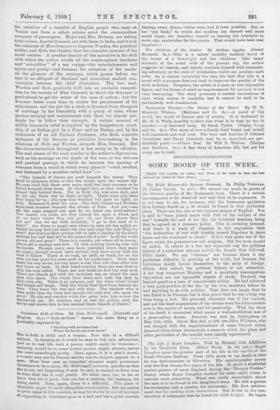SOME pocas OF THE WEEK.
[Under this heading ,ms notice sack Book* of the tesek as hoes not bun reserved for 1111400 in ether firms.]
The Right Honourable Spencer Perceval. By Philip Treherne. (T. Fisher TJnwin. 5s. net.)—We cannot say much in praise of the literary quality of Mr. Trolierne's book. There is a certain inconsequence to be observed now and then in its argument. It is not easy to see, for instance, why the humorous quotation from Sydney Smith on p. 46 should be found in that particular place. There are, too, one or two curious wages of English. Fox is said to "have joined issues with Pitt on the subject of the war" towards the end, of his life, the intended meaning being that he agreed on a common policy. This is certainly unusual. And there is a want of elegance in the expression that "the declaration of war with Austria caused Napoleon to leave Spain and the command to Soult." It is a very queer use of the figure which tlie grammarians call zeugma. But the book should be useful. It relates in a fair and impartial way the political history of a somewhat obscure period, the decade that followed Pitt's death. We say "obscure," not because there is any particular difficulty in arriving at the truth, but because the historians chiefly devote themselves to the story of foreign affairs. And, indeed, the political history is not attractive. A not very competent Ministry and a peculiarly unscrupulous Opposition are not agreeable objects of study. Perceval was beyond question a man of considerable ability. He had achieved a very good position at the Bar by his own exertions before lie had anything to de with politics. That does not imply that he was fitted to be Premier, but it does prove that he was a long way from being a fool. His personal character was of the highest, and not the least conspicuous of his virtues were his disinterested- ness in the matter of money and his generosity. 'With the story of his death is connected what seems a well-established case of a premonitory dream. Perceval was shot by Bellingham, on May 11th, 1812. About May.2nd or 3rd one John Williams, who was charged with the superintendence of some Cornish mines, dreamed three times successively a scene in which the place and other particulars of the murder were exactly represented.









































 Previous page
Previous page